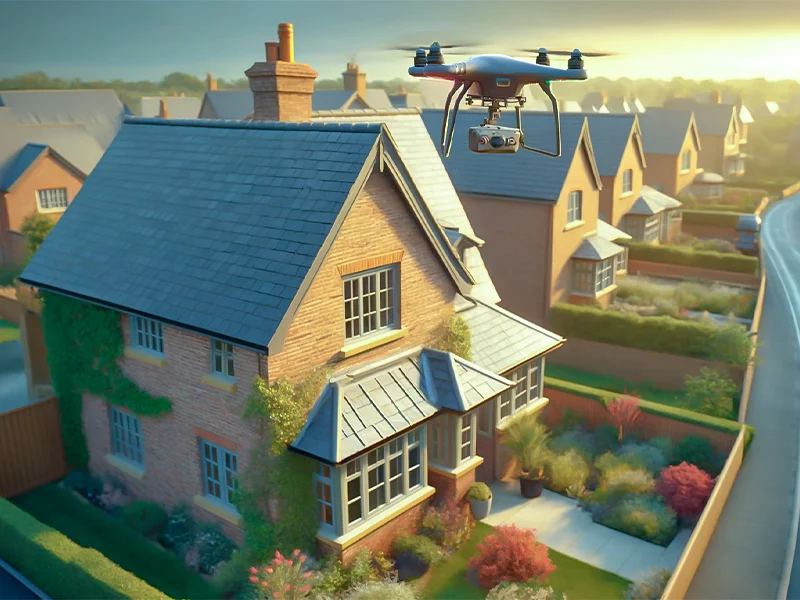

Drones Roof Inspections
Benefits of Using Drones for Roof Inspections
1. Safety
2. Accessibility
3. Speed and Efficiency
4. Cost-Effective
Drone roof inspections are typically less expensive than traditional methods because they may be completed more quickly and with fewer resources. Businesses may see a decrease in labour expenses and downtime because of this.
Also Explore: Top 7 Benefits of Drone Survey
What Makes a Drone the Best Option for Roof Inspections?
1. Sturdiness and Resistance to Weather
Robust Construction: To ensure lifespan and dependability, the drone needs to be constructed to endure modest wind gusts and even collisions.
2. Dimensions and Weight
3. Range and Life of Batteries
Longer Battery Life: Greater battery life enables continuous inspection of larger areas. It is ideal to have a drone with a minimum battery life of 20 to 30 minutes.
Sufficient Range: Make sure the drone can cover the whole roof without adjusting its position multiple times. Remember that the UK’s regulations require you to always have a clear line of sight with your drone.
4. Ease of Control
Control System User-Friendly Interface: Inspectors should be able to fly the drone with little to no training in its user-friendly control system.
Automated Flight Modes: Features like automatic take-off and landing or waypoint navigation help speed up the inspection process.
5. High-Resolution Camera
6 Best Drones for Roof Inspection
1. DJI Phantom 4 Pro V2.0
Specifications: 20MP camera, 4K video, 30-minute flight time.
Obstacle avoidance: Forwards, backwards, downwards
Pros: High-resolution camera, stable flight, reliable obstacle avoidance.
Cons: Bulky non-folding design, ageing platform
This drone is suitable for proficient roof inspectors requiring detailed imagery.
2. DJI Mavic Air 3
Specifications: 48MP camera, 4K video at 60fps, 46-minute flight time
Obstacle avoidance: Forwards, backwards, upwards, downwards, Sides
Pros: Good balance of portability and camera quality, 3x medium telephoto lens
Cons: Despite its diminutive size, it weighs more than the magical 250g.
Suitable for frequent, varied condition inspections.
3. Autel Robotics EVO II
Features include a 48MP camera, 8K video recording, and a 40-minute flying duration.
Avoiding obstacles in the following directions: up, down, sideways, and forwards
Pros: Long flight duration, excellent camera resolution.
Cons: For roof inspections, an 8K video can be too much.
Ideal for: Prolonged examinations needing in-depth photos.
4. DJI Mini 3 Pro
Features include a 48MP camera, 4K video, and a 34-minute flying duration.
Avoid obstacles by moving forward, backward, upward, downward, and sideways.
Pros: Excellent camera quality, considering its size and portability.
Cons: Not as appropriate in windy environments.
Ideal for: Inspections when lightweight and portability are essential.
5. DJI Mini 4 Pro
Features: 48MP, 4K video, and 34 minutes of flying duration.
Avoid obstacles by moving forward, backward, upward, downward, and sideways.
Advantages: Better camera performance in a small package.
Cons: Not as long-lasting on batteries as larger ones.
Ideal for: Inspections when lightweight and portability are essential.
6. DJI M30
Features: 12MP wide, 48MP zoom, and a maximum flying time of 41 minutes.
Avoid obstacles by moving forward, backward, upward, downward, and sideways.
Advantages: Adaptable camera settings, lightweight construction, well-balanced functionality, and use.
Cons: Fixed cameras at excessive cost.
Ideal for: A wide range of inspection requirements, especially those where camera versatility and portability are essential.
The majority of 48MP drone cameras are not actually 48MP. By using Quad Bayer Sensors, they can multiply the camera’s actual resolution by four. Whether or whether this strategy works well to produce a more detailed image is up for discussion.
Also Check: 7 Best Drones for Surveying & Mapping
Conclusion
Roof inspections are essential to maintaining the strength of the roof and identifying any potential issues early on. In addition to guaranteeing safety and adhering to building requirements, this can help a roof last longer and remain efficient.
Ready to revolutionize your roof inspections? Experience the safer, more efficient, and cost-effective solution with S2P’s drone surveys. Ensure the longevity and performance of your roof while minimizing risks and maximizing convenience.
Contact us today to schedule your drone roof inspection and elevate your maintenance practices.
Previous Post
← 7 Best Drones for Surveying & Mapping